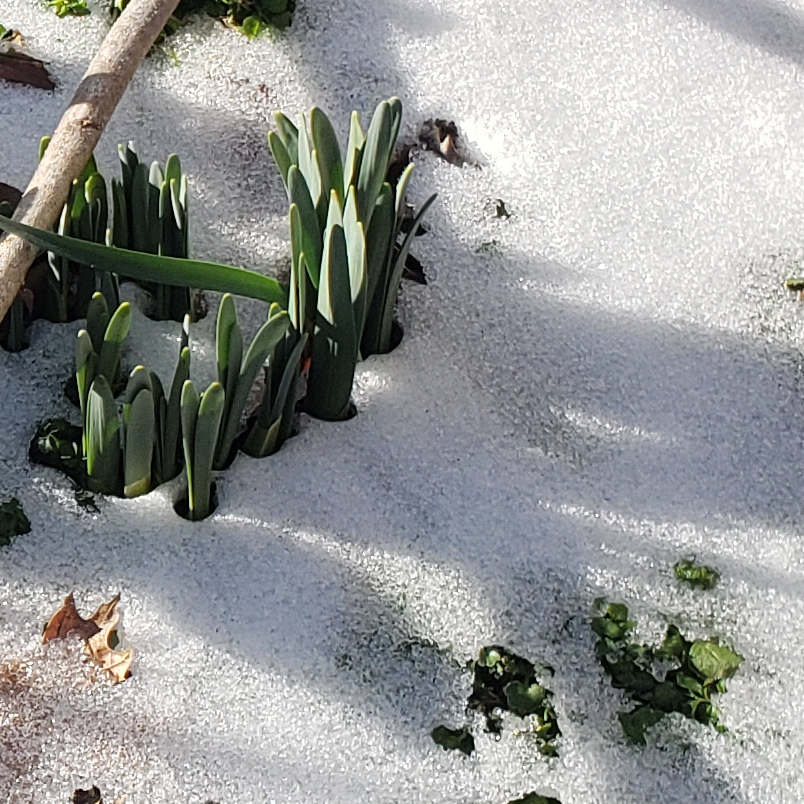
We are in the bleak mid-winter. For days and days, to glance out the window has been to feel one’s soul gripped by drear. Step outside and the air is wet, the cold penetrating.
Christmas, timed near the winter solstice, can hardly be said to occur in the midwinter; maybe in poet Christina Rosetti’s England it did, but not here in my little bit of the northern hemisphere. At Christmas, the days were perceptibly no longer than at the solstice on December 21st, and we have since been enduring the journey through the barren time, which will continue for another month or so.
All the same, the carol “In the Bleak Mid-Winter,” a deep, rich tune by Gustav Holst (yes, he of the The Planets) set on a poem by Rosetti, can be beautiful beyond expression, an enduring beauty that can stir the spirit long past December, into the still bleaker January and February.
I love Christmas carols. My sheet music library includes lyrics in at least four languages and my CD collection numbers at nearly 100. Yet in few carols do words and music resonate so well as in “In the Bleak Mid-Winter.” The cold in the opening stanza recalls what I used to call “the dry times,” when one knows one has a soul only from the isolation of acute disconnection from it. Trapped in the particular, one jogs from task to task, event to event, sleep to sleep, a series that feels endless but is in fact a distraction from the inevitable end we all face, the limit to the time we have to do something that matters. In these times, the spiritual desolation seems complete: water cannot get harder than stone (see line 4).
But there is rescue in this melody that speaks calm and quiet and peace – if there is a Christmas peace, this song is certainly where I hear it; there is rescue too in the depths of snow Rosetti’s poem describes. This snow hasn’t just fallen; it’s blanketing and reblanketing the hard ground, sibilantly soft: “snow on snow, snow on snow.” Oddly, in an act of profound misunderstanding, some recordings leave out that second “snow on snow.” We need that line, for as snowflakes land on snowflakes, they shroud the earth and, with it, the psychic boundaries of the material world. I always imagine this poem set at night: the air alive with falling snow, deep and dark, lit only by light scintillating off the snowflakes. The flakes fall silently, their silence a stillness in motion. Such a night surrounds one with mysterious energy. The desolation is no more.
This, this wholeness of soul, is what we can carry with us from Christmas into the barren time. It is a wholeness that fills us as the Angels and Archangels, Cherubim and Seraphim, crowd the air around the stable in Rosetti’s poem. And this life, this love, this genesis, this creative force, this God within, cannot be contained (see line 9). It must be a catalyst and a call; and, if we want to make something meaningful of this life, then we must act, we must answer.
-Hannah Grachien, February, 2021.
In the Bleak Mid-Winter
By Christina Rosetti
In the bleak mid-winter
Frosty wind made moan,
Earth stood hard as iron,
Water like a stone;
Snow had fallen, snow on snow,
Snow on snow,
In the bleak mid-winter
Long ago.
Our God, Heaven cannot hold Him
Nor earth sustain;
Heaven and earth shall flee away
When He comes to reign:
In the bleak mid-winter
A stable-place sufficed
The Lord God Almighty,
Jesus Christ.
Angels and archangels
May have gathered there,
Cherubim and seraphim
Thronged the air,
But only His mother
In her maiden bliss,
Worshipped the Beloved
With a kiss.
What can I give Him,
Poor as I am?
If I were a shepherd
I would bring a lamb,
If I were a wise man
I would do my part,
Yet what I can I give Him,
Give my heart.
